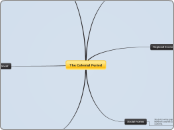The Colonial Period
Settlement
Students will describe why colonists came to America and where they settled
Acceptable Evidence: Students will create an organizer listing the settled regions, who settled the area, and why they came.
Teacher Activity: Teacher gives web-based lecture on the early British Colonies
Student Activity: Students take notes on graphic organizer during lecture
Students read pages 24- the top of page 27 to reinforce concepts learned in class and to comlete the organizer
Regional Economies
Students will analyze the relationship between the environment and the subsequent developing economies.
Acceptable Evidence: Students will create flyers or pamphletes to entice newcomers to the region. Pamphletes will detail the environment, what the community is like, and what type of work is available to them.
Teacher Activity: Teacher will provide a sample, rubric, and explicit instructions for students for the project.
Students Activity: Students will compile information, pictures, maps, etc from the book and online sources to complete the project.
Student Activity: Students will work in groups of three to create (3) flyers, one for each main region. All students will be responsible for the accuracy of the flyers, so they therefore have a vested interested to complete the research together, even though they will split the creation of the flyers.
Social Norms
Students will explain the social differences between the Northern and the Southern colonies based on religion and customs.
Acceptable Evidence: Students write a two paragraph essay comparing and contrasting the socities of the North and South
Teacher Activity: Teacher lectures on the Northern vs. Southern societies that emerged because of the patterns of settlement and regional economies that we discussed before.
Teacher Activity: Teacher provides direct instruction on how to write a compare and contrast paper. Instruction includes specific language development tools such as sentence frames and transition words.
Teacher provides students with rubric for essay
Students take notes (T-style) on the lecture
Student Activity: Students create a rough draft and then excange with a partner for peer review using the rubric as a guide.
Student Activity: Students create and present a final draft of the essay
Revolution
Students will examine the events that led to the revolution, and evaluate the extent to which the Americans were warranted in declaring independance.
Acceptable Evidence: Students will create a popplet organizer and a thesis statement that express their opinion on the extent to which the American colonists were justified in rebelling against Britain
Teacher procides direct instructions on how to complete DBQ assignment
Teacher gives students necessary vocabulary and instruction to complete the assignment and models the first DBQ with the students.
Teacher provides student sample of Popplet as well as sentence starters for the thesis statement
Students complete Vocabulary excercise
Students read Primary sources and evaluate their source and context, as well as perform a close reading of each document
Students complete a Popplet Organizer and create a thesis statement evaluating whether or not the Americans were justified in breaking away from England.
Growing Dicontentment
Students will evaluate how the ideas of the Enlightenment influenced political thought in the colonies
Acceptable Evidence: Will participate in a Dinner Party in the persona of the Enlightenment thinkers we covered in class.
Through a lecture, teacher introduces students to the key Enlightenment thinkers that influenced the "American" way of thinking, including Hobbes, Locke, Rousseau, and Montesquieu.
Teacher will split students into groups of four and provide the dinner party topics to the students so that they can prepare
Students will be split into groups of four and each person will be responsible for taking on a persona for the dinner party.
During the dinner party, each group will sit in the "hot seat" for a question. All the questions would have been given ahead of time, but students would not know which question they would have to answer, and will therefore have to prepare to answer all the questions.
Colonial Government
Students will explain how the colonies were governed and the growing taste for self-government.
Students will take a quiz on the information covered in the text
Teacher Activity: Teacher provides reading and vocabulary sheet to students
Student Activity: Students work in pairs to complete reading assignment and the applicatble questions
Student Activity: Students take a quiz cosisting of true/false and short answers over the information presented.
